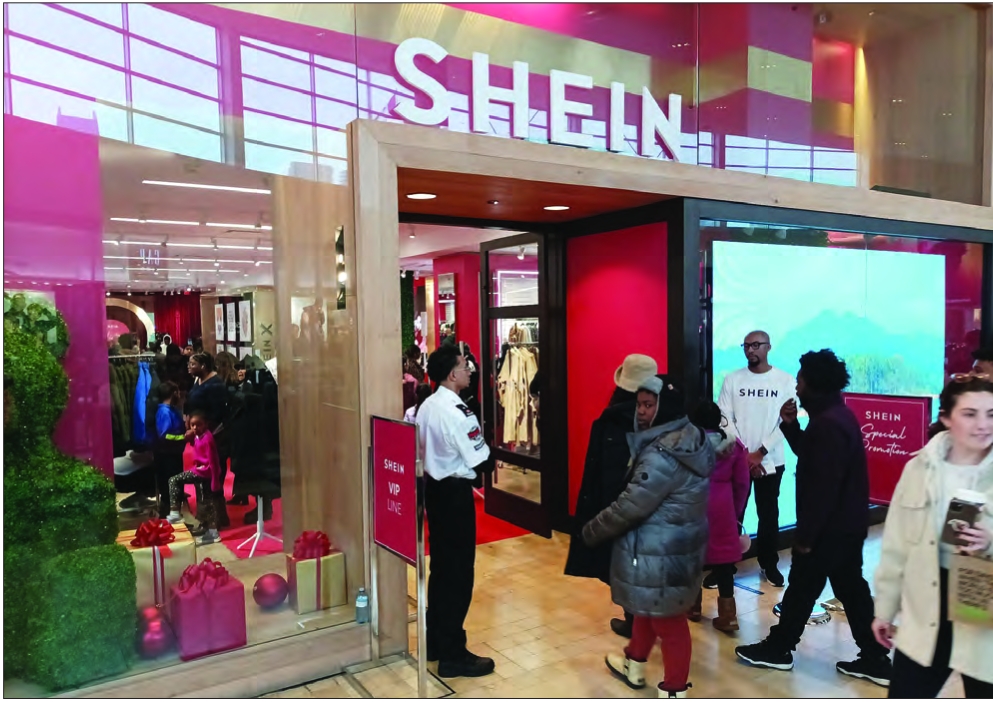
Shein retail shopEvery day, hundreds of social media fashion influencers inundate TikTok, Instagram, and YouTube with videos showing off eye-popping hauls from Temu, Shein, and other low-priced, fast-fashion brands. They film themselves ripping open packages crammed with skirts, shirts and outfits — often sent free of charge — then model the goods for the camera, enticing other people to buy.
The most popular videos can attract hundreds of thousands of eyeballs; one fashion review alone can garner upwards of 100,000 likes, which can translate into major sales for the brands. For the Asian-based retailers of $10 blouses and $15 jeans, hungry to conquer the U.S. market, the posts are advertising gold.
But there’s ample evidence that those trendy, unbelievably-priced fashions come with a hidden price: potentially lethal chemicals clinging to your skin.
TikToker @PaulsLaw wants you to know about it — and calls out Temu and Shein, two of the hottest online retailers, as brands to avoid.
“Your skin is your largest organ, and it eats everything you put on it!” warns @PaulsLAW.
He’s not wrong: Scientists and public health experts are sounding the alarm about synthetic fabrics and chemical-based products commonly used in the fast-fashion industry. They say cheap clothing and goods are a fast-growing source of illness, from rashes and migraine headaches to breast and prostate cancer.
Unsafe but growing fast
That’s bad news for Black consumers: data shows Black people in general are at higher risk of contracting serious illnesses, and with worse outcomes, than whites. And many of Temu and Shein’s popular social-media fashion influencers are Black people.
Thanks to California’s Proposition 65, Shein and Beverly Hills-based Fashion Nova have been cited for selling products that contain a toxic chemical linked to cancer, birth defects and other reproductive harm. Daily fines for violating Proposition 65 can be up to $2,500, but there’s no evidence Shein was forced to pay the fine.
Last month, the U.S. Consumer Products Safety Commission called for an investigation into Shein and Temu — arguably the two most popular, fastest-growing, lowest-priced e-retailers — because of concerns that shoppers can buy baby and toddler products that do not meet U.S. safety regulations.
In response, Temu told the commission it agrees customers should be protected.
“Our interests are aligned with the U.S. Consumer Product Safety Commission (CPSC) in ensuring consumer protection and product safety, and we will cooperate fully with any investigation,” a Temu spokesperson told ABC News. The company also said it requires all sellers “to comply with applicable laws and regulations, including those related to product safety.”
While the U.S. is slowly coming to grips with the issue, regulators in Asian and European countries are already taking steps to address it. They have penalized low-priced fashion retailers for selling products containing dangerous levels of toxic chemicals, including lead, formaldehyde and phthalates — man-made chemicals used to manufacture plastics.
Earlier this year, South Korean authorities accused Shein of selling a shoe line that contained 428 times the permitted levels of phthalates and lead. During regular inspections, Seoul authorities examined 93 Shein products and found that half of them are
manufactured using toxic chemicals. Exposure to any amount of lead is
dangerous, and the phthalates that make plastics more flexible have been
linked to breast cancer, colon and prostate cancer.
Shein
and Temu sell everything from kitchen items, gadgets and baby gear to
clothing for infants and adults. And while an estimated 97% of clothing
sold in the U.S. is imported, there are no federal regulations limiting
chemicals in those products.
Meanwhile,
as Temu and Shein become more popular in the U.S., their American
footprint keeps getting bigger. Temu and Shein, respectively, are the
top two downloaded shopping apps in the Apple Store, blowing past
Target, Walmart, and Amazon. Both companies take in tens of billions of
dollars in revenue per year.
‘Avoid at all costs’
A
casual look on social media shows fast fashion is popular with Black
Americans. But the health risks may not be worth high style for low
prices.
Black people are more
likely to be diagnosed with cancer than any other U.S. demographic. They
also have a lower overall fiveyear cancer survival rate than white
Americans and are more likely to be diagnosed with female breast, lung
and colorectal cancers at later stages when the disease is harder to
treat.
But it’s also
clear that the warnings are breaking through. A search of “Shein and
Temu toxic” on TikTok turns up hundreds of videos from posters talking
to their followers about the investigations into toxic clothing.
Organizations
like Australia-based Good On You are spreading the word about Shein and
Temu, which are on their list of “10 Fast Fashion Brands We Avoid At
All Costs.”
Environmental
and health advocates recommend that consumers buy clothing made from
natural fabrics, like cotton, wool, silk, or leather, rather than
synthetic materials. Consumers looking to avoid toxic chemicals can
check for third-party certification standards such as the Oeko-Tex
Standard 100, Global Organic Textile Standard (GOTS), the EU Ecolabel,
or the bluesign® certification.
Several
influencers also warn consumers not to use skin care products the
brands sell. One influencer, @theshaniquadupree, puts on gloves when
opening the product bag and tells viewers she will launder the clothing
before she wears it.
“Y’all, I really like this outfit,” she jokes to her more than 56,000 TikTok followers. “But I like my ovaries so much more.”